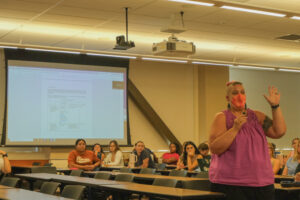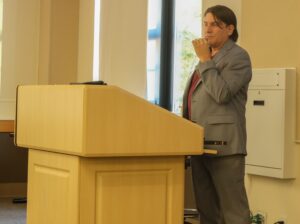by Yucheng Tang
posted Sept. 26
This story was updated Sept. 28 as more detail on the policy emerged.
On a list of 174 locations on the Chico State campus, only three are listed as “Public” that are available for sound-amplified assembly, marches, protests, and debate between 8 a.m. and 5 p.m. weekdays by reservation, based on the newly-introduced, California State University (CSU) Interim Time Place Manner policy.

However, university spokesman Andrew Staples said Sept. 27 that outside spaces at Chico State, including Trinity Commons, can be used for “demonstrations, protest etc.” during campus operating hours that are 7 a.m. to 11 p.m. daily if the area hasn’t already been reserved. A document sent to ChicoSol Sept. 28 called “Addendum Specifics” says those areas can be used for “non-amplified speech and expression.”
The policy was discussed during the Sept. 25 forum held by Chico State’s Office of Equity, Diversity, & Inclusion. Around 60 people attended the forum in Colusa Hall. The policy was established for all CSU campuses to regulate the use of university property.
Joseph Morales, university diversity officer, explained that the CSU Chancellor’s office developed the framework, and each university was asked to prepare a campus-specific addendum detailing how the policy would be implemented.
Based on the addendum posted by Chico State, university property is divided into “Public,” “Limited,” and “Non-Public.” Only “Public” locations are available for sound-amplified free speech activities, and the addendum’s page 2 restricts usage in Limited areas.
“You would agree the sidewalk outside the BMU (Bell Memorial Union) is a public area, right?” asked a student attending the forum. “But it is listed under your list of properties as a limited area. Can you help us understand how that’s fostering discourse and freedom of speech?”
The new policy also listed prohibited activities on university property, including camping, overnight demonstrations and overnight loitering.

Morales stressed that administrators will stick to the principle of “viewpoint and content neutrality,” which means they can only regulate where, when and how to hold the activities, but cannot interfere with the topic and viewpoints of the activities themselves.
Several audience members associated the new policy with a perceived crackdown on pro-Palestinian protests. One student said: “We all know that this policy is only now being put into effect to deny students’ ability to protest the CSU – after [spring] protests against Israel’s active genocide of Palestinian people. By this policy, protest is only permitted when and if the CSU deems it appropriate.”
Morales responded to the student: “My understanding is that many of the things that are understood to be new were already in existence. They just hadn’t been stated explicitly, like you can’t bring explosives to campus. Nothing happened in the last two months. ”
According to the CSU website, “While the requirements in the policy are not new and are already in place in many respects at each university and at the Chancellor’s Office, they are newly merged into a systemwide policy.”
“No building or campus space has been shifted into a new category because of the new policy” — Andrew Staples
Chico State’s Staples responded to a question from ChicoSol by email. “Overnight camping was not previously allowed under campus policy,” Staples noted. “Public, limited, and non-public is how space on campus is categorized. No building or campus space has been shifted into a new category because of the new policy.”
Some students and faculty members asked questions about what could be negative implications of the new policy on freedom of speech.
“For things that have been more politically contentious, I think I’m really afraid that it will just leave the possibility in the future open for those kinds of things to be quashed in silence,” said Adin White, an anthropology student at Chico State.
“It’s not really the details of the policy but the spirit of the policy, especially when it was enforced without much interaction with stakeholders like students and faculty, that really concerns me,” White said.
White told ChicoSol that he was worried the forum was just an opportunity for people to let off steam.
Michelle Rose, a political science professor at Chico State, also expressed concern.
“I’m concerned, given the context of the protests around the country, that the more explicit directions are also meant to facilitate the easier arrest of folks who are choosing to exercise their right to free speech.”
Aaron Schwartz, executive vice president of Associated Students, told ChicoSol after the forum: “From my understanding in the meeting, you were never able to protest in those non-public and limited areas, but now they are put in the written policy so the school can enforce it.”
“The misunderstanding that I have and what I am trying to figure out is how they are deciding what buildings are public or private. 25 Main Street is a non-public building on the list; it’s the Chico State Enterprises. How are you arguing it isn’t a building designed for public use while its mission statement is to go out into the community and engage?”
Revisions, he said, are “only gonna happen if students continue to remain vigilant and stay on top of this.”
Seema Sehrawat, the chief of staff to the university president, spoke during the forum: “I see that it says there are only three public areas. And I see that you are all saying that it’s restrictive. It’s our responsibility to go back, take this feedback and work on that. I heard that loud and clear.”
Yucheng Tang is a California Local News Fellow reporting for ChicoSol.
This story was clarified to note that protests and demonstrations involving sound-amplification are the activities limited to public areas. The spelling of Adin White’s name was also corrected.
